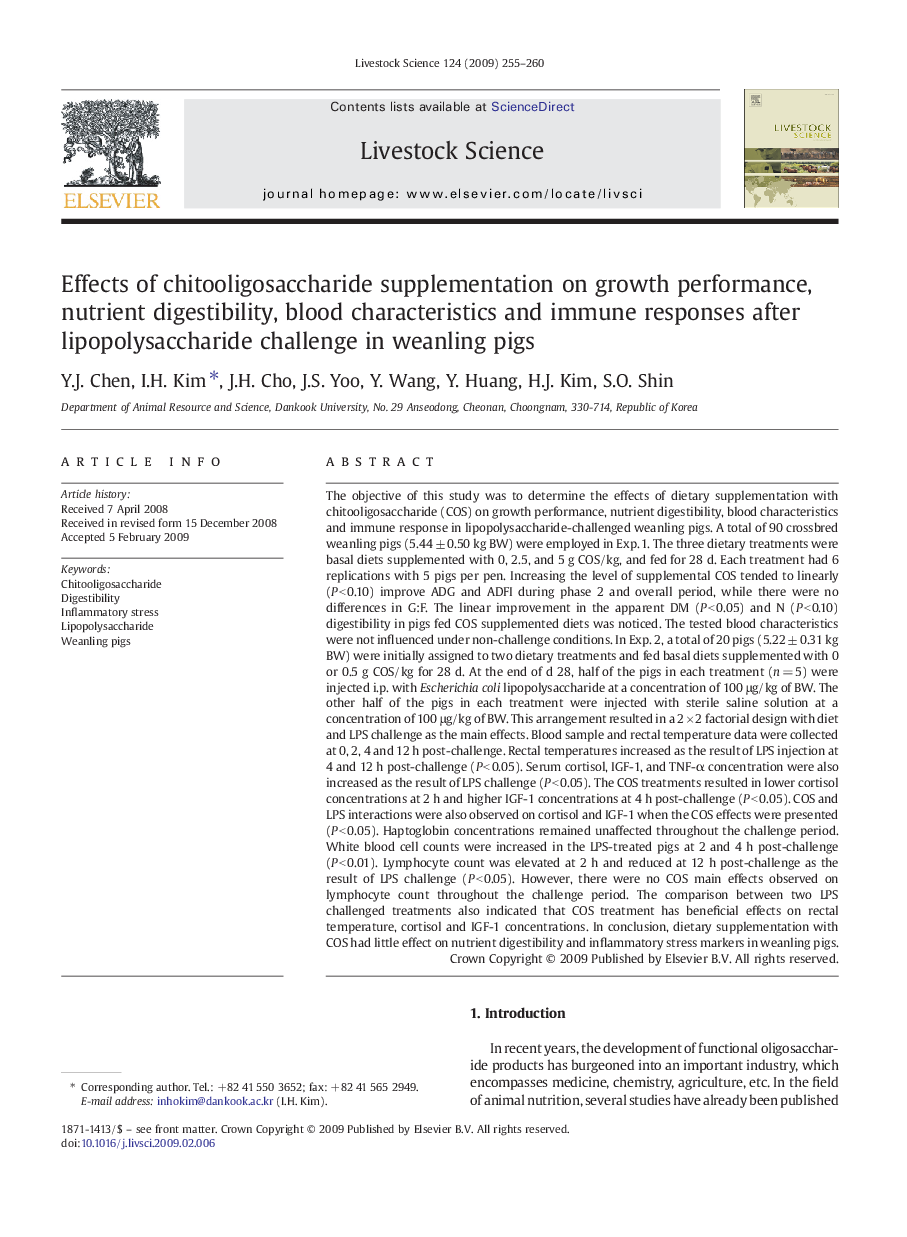| کد مقاله | کد نشریه | سال انتشار | مقاله انگلیسی | نسخه تمام متن |
|---|---|---|---|---|
| 2448066 | 1554008 | 2009 | 6 صفحه PDF | دانلود رایگان |

The objective of this study was to determine the effects of dietary supplementation with chitooligosaccharide (COS) on growth performance, nutrient digestibility, blood characteristics and immune response in lipopolysaccharide-challenged weanling pigs. A total of 90 crossbred weanling pigs (5.44 ± 0.50 kg BW) were employed in Exp. 1. The three dietary treatments were basal diets supplemented with 0, 2.5, and 5 g COS/kg, and fed for 28 d. Each treatment had 6 replications with 5 pigs per pen. Increasing the level of supplemental COS tended to linearly (P < 0.10) improve ADG and ADFI during phase 2 and overall period, while there were no differences in G:F. The linear improvement in the apparent DM (P < 0.05) and N (P < 0.10) digestibility in pigs fed COS supplemented diets was noticed. The tested blood characteristics were not influenced under non-challenge conditions. In Exp. 2, a total of 20 pigs (5.22 ± 0.31 kg BW) were initially assigned to two dietary treatments and fed basal diets supplemented with 0 or 0.5 g COS/kg for 28 d. At the end of d 28, half of the pigs in each treatment (n = 5) were injected i.p. with Escherichia coli lipopolysaccharide at a concentration of 100 μg/kg of BW. The other half of the pigs in each treatment were injected with sterile saline solution at a concentration of 100 μg/kg of BW. This arrangement resulted in a 2 × 2 factorial design with diet and LPS challenge as the main effects. Blood sample and rectal temperature data were collected at 0, 2, 4 and 12 h post-challenge. Rectal temperatures increased as the result of LPS injection at 4 and 12 h post-challenge (P < 0.05). Serum cortisol, IGF-1, and TNF-α concentration were also increased as the result of LPS challenge (P < 0.05). The COS treatments resulted in lower cortisol concentrations at 2 h and higher IGF-1 concentrations at 4 h post-challenge (P < 0.05). COS and LPS interactions were also observed on cortisol and IGF-1 when the COS effects were presented (P < 0.05). Haptoglobin concentrations remained unaffected throughout the challenge period. White blood cell counts were increased in the LPS-treated pigs at 2 and 4 h post-challenge (P < 0.01). Lymphocyte count was elevated at 2 h and reduced at 12 h post-challenge as the result of LPS challenge (P < 0.05). However, there were no COS main effects observed on lymphocyte count throughout the challenge period. The comparison between two LPS challenged treatments also indicated that COS treatment has beneficial effects on rectal temperature, cortisol and IGF-1 concentrations. In conclusion, dietary supplementation with COS had little effect on nutrient digestibility and inflammatory stress markers in weanling pigs.
Journal: Livestock Science - Volume 124, Issues 1–3, September 2009, Pages 255–260